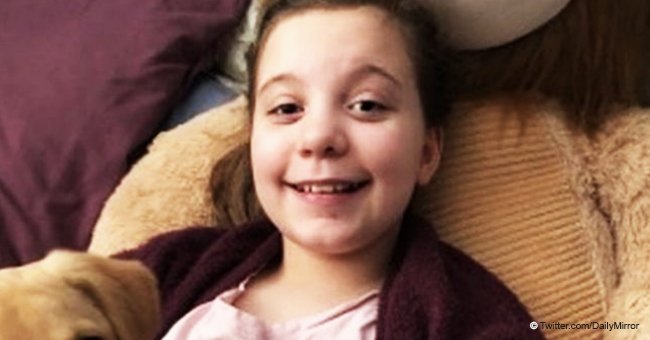
Mysterious Illness Makes 10-Year-Old Girl Speak and Act like a Toddler
A mysterious illness is causing a ten-year-old girl from Lincolnshire to suffer seizures that make her act like an infant.
Alethia Greenfield, of Donington, was leading a normal and healthy life, like any other girl of her age, and was an active, happy, little girl. She had been complaining of pain in her feet and could barely walk on her tip-toes, and one day in April 2018, she woke up feeling an unbearable pain.
That was just the start of the symptoms that would eventually lead the girl to lose all mobility last January. She has also become susceptible to light and noise and has to wear noise-canceling headphones.
SHE STARTS TO ACT LIKE A TODDLER
The schoolgirl also suffers from a series of non-epileptic seizures every day, and afterward, she will wake up talking and acting like a toddler, to the point that she is now incontinent.
However, those kinds of attacks are momentary, and after some time, she returns to her 10-year-old mental state.
“For example, one day it was like she'd forgotten completely how to use and knife and fork and would need to be fed, only for the full use of her hands to return the following day,” her family explained.
Even though Alethia is fully aware and can hear and speak, she can’t move her head and has to be put into position and propped up entirely on cushions.
“She was a normal, happy and very active 10-year-old until last April. She would do three to four miles of walking. I would come home from work and say it was a nice day and she would be the first one off the sofa. She used to go horse riding,” said her mother, Emilia.
THE CONDITION IS TAKING A TOLL ON THE FAMILY
Alethia can’t be left alone and has to sleep on a mattress on the floor. Because of this, Emilia had to quit her job and become a full-time caretaker of her daughter.
The former receptionist says that the situation has also taken a toll on her two older children. She said:
“My daughter is 14, and my son is 13, and it has had a massive effect on them. You don’t expect to see your younger 10-year-old sister acting like a baby.”
DOCTOR’S COULDN’T GIVE A PROPER DIAGNOSE
Doctors have not been able to locate the cause of Alethia’s condition.
At first, they thought the pain on her feet could be fixed by stretching her Achilles' tendons, so she had to wear casts on both legs. But after removing it, Alethia’s lost all mobility on her feet. She couldn’t even stand up.
She was referred to a neurologist who suspected that Alethia had a functional neurological disorder, the name given to the symptoms believed to be caused by the nervous system.
But despite a series of medical tests and scans, nothing has backed up the assumption.
Lincolnshire doctors are still dumbfounded, so now Alethia is being referred to Great Ormond Street, where the family hopes to get the answer to the cause of her condition.
RAISING FUNDS FOR A GOOD CAUSE
Meanwhile, the girl can’t leave the house, although the family expects this to change when a wheelchair arrives in the next days. But this chair doesn’t fit in the family’s car, meaning they can only take Alethia down a walking distance.
The family hopes to raise £ 5,000 to pay for a specialized car seat that fits Alethia's needs and help her out.
For that, they created a GoFundMe page to raise the necessary funds. A friend of the family will be running the London marathon as well, hoping to add more funds for the girl.
A publication on the page says: " Alethia desperately needs so many things to make life easier, and her family is doing their best to provide them, but her immediate need is for a car seat that is capable of holding her entire body completely still.”
And added,
“Alethia is such an adorable child, such a gentle spirit, and it would make her life so much easier if she can get out of the house again. She's far too young to understand how ill she is, and we all want to give her a better quality of life and full access to all the hospital appointments so that she can be healed as soon as possible.”
GOING OUT CAN GIVE HER HOPE
Emilia is desperate to see her daughter return to the outdoors and enjoy nature as she used to do.
She said: " Any parent would fight to make their child ok. I want to give her the best chance we can anyway. If this is her life then so be it, but I won’t stop fighting for my daughter.”
For Alethia to go out, if only to see her mother plant tomatoes, will give her some hope.
According to FND Hope, "Functional Neurological Disorder provides an umbrella term for a variety of symptoms of apparent neurological origin but which current models struggle to explain psychologically or organically."
Professor Mark Edwards explains that:
"In FND, the basic wiring of the nervous system is ok, and instead it is the control of the body that has gone wrong. A good example of this is Hoover’s sign for functional weakness, where a person may have significant weakness of one leg when they are consciously trying to move it, but the power in the leg returns to normal when movement is triggered in a different way, usually by asking the person to lift up their other leg."
The foundations seeks to promote awareness, support affected individuals, and advance research for the prevention, treatment and recovery of FND.
The information in this article is not intended or implied to be a substitute for professional medical advice, diagnosis or treatment. All content, including text, and images contained on news.AmoMama.com, or available through news.AmoMama.com is for general information purposes only. news.AmoMama.com does not take responsibility for any action taken as a result of reading this article. Before undertaking any course of treatment please consult with your healthcare provider.
